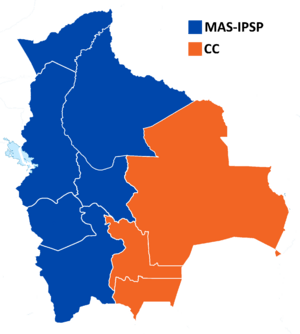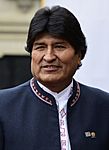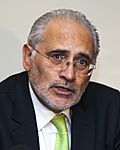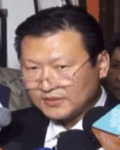2019 Bolivian general election facts for kids
|
|||||||||||||||||||||||||
| Turnout | 88.31% ( |
||||||||||||||||||||||||
|---|---|---|---|---|---|---|---|---|---|---|---|---|---|---|---|---|---|---|---|---|---|---|---|---|---|
|
|||||||||||||||||||||||||
 |
|||||||||||||||||||||||||
|
|||||||||||||||||||||||||
The 2019 general elections in Bolivia were a major event where people voted for their leaders. On October 20, 2019, Bolivians went to the polls to choose a new president, vice president, and all the members of their parliament. These elections became very important because of disagreements about how fair they were.
Contents
What Was the Election About?
In Bolivia, general elections are held to choose several important leaders. Voters cast their ballots for a president and a vice president. They also elected all 130 members of the Chamber of Deputies and 36 senators. These groups work together to make laws and govern the country.
Choosing the President and Vice President
The president is the head of the country, similar to a school principal but for a whole nation. The vice president helps the president. In Bolivia, if a candidate for president gets more than 50% of the votes, or gets at least 40% and is more than 10 percentage points ahead of the second-place candidate, they win right away. If not, the top two candidates would go to a second round of voting, called a run-off.
Electing Lawmakers
The Chamber of Deputies and the Chamber of Senators are parts of Bolivia's parliament. They are responsible for creating and approving laws. Each member represents different parts of the country, making sure people's voices are heard in the government.
Election Results and Disputes
After the votes were counted, the current President, Evo Morales, was announced as the winner. He received 47.08% of the votes. This was more than a ten-point lead over his closest competitor, Carlos Mesa, who got 36.51%. Because of this lead, President Morales was declared the winner without needing a second round of voting.
However, many people in Bolivia questioned the fairness of the election results. They believed there were problems with how the votes were counted and how transparent the process was.
Protests and Concerns
The concerns about the election led to widespread protests across Bolivia. People took to the streets to show their disagreement and demand a closer look at the election process.
The Organization of American States (OAS), an international group that helps countries in the Americas, also looked into the election. They stated that they found "clear manipulation" and important problems with how the election was run. These findings added to the public's concerns about the election's fairness.
Aftermath of the Election
Due to the widespread protests and the findings from the OAS, the results of the election were later cancelled. This led to a period of political change in Bolivia. Eventually, Jeanine Áñez became the acting president.
See also
 In Spanish: Elecciones generales de Bolivia de 2019 para niños
In Spanish: Elecciones generales de Bolivia de 2019 para niños
 | Leon Lynch |
 | Milton P. Webster |
 | Ferdinand Smith |




